Through their art and music, Magic Mama delivers a hope-filled message of love and respect for all of life, and inspires creative thinking and earth-friendly actions.

⊗
The Magic Mama Story
Where it all began: Kjersten Hallin (she/they) Swedish/Norwegian ancestry, born in what is now called Minnesota, (from a Dakota phrase, Mni Sota Makoce, which translates to “land where the waters reflect the clouds.” ) lands of the Anishinaabe, Lakota and Dakota peoples. They have been singing, playing music and making art their whole life. As a child, Kjersten was always fascinated by the natural world and enjoyed playing in the woods, collecting rocks, discovering flowers and insects and mushrooms, singing with birds, listening to trees, wading in creeks, swimming in lakes, tromping through snow, and camping with their family. These threads have continued to weave through to the present moment.

⊗
College and early career life: Kjersten lived on the shores of Gichigami (Lake Superior) for several years while attending the University of Minnesota, where they volunteered for the Outdoor Program while studying Art and Education. For a senior art exhibition, Kjersten was gifted their first guitar. After graduating with degrees in Fine Arts, K-12 Art Education, a minor in Art History and an emphasis in Outdoor Education, Kjersten traveled, with guitar in hand, to the West Coast where they worked as an art specialist for several schools and community centers while falling in love with the ocean and redwood forests in the homelands of the Miwok and Pomo people.
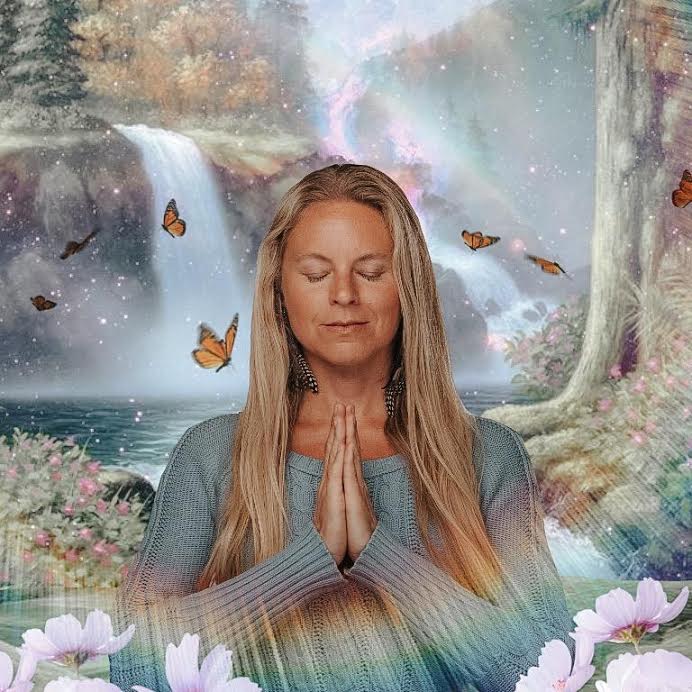
⊗
Enter -Kjersten’s first child. Born on Pomo land during an El Niño winter. Everyday, while pregnant with Sage, Kjersten walked the headlands of so-called Mendocino, drumming on their belly and singing to the sea. After Sage was born, that very rhythm began to grow lyrics and melody and would become the inspiration for the album Rodeo deGaia. deGaia – meaning “of Earth”, the last name of both Kjersten’s children.
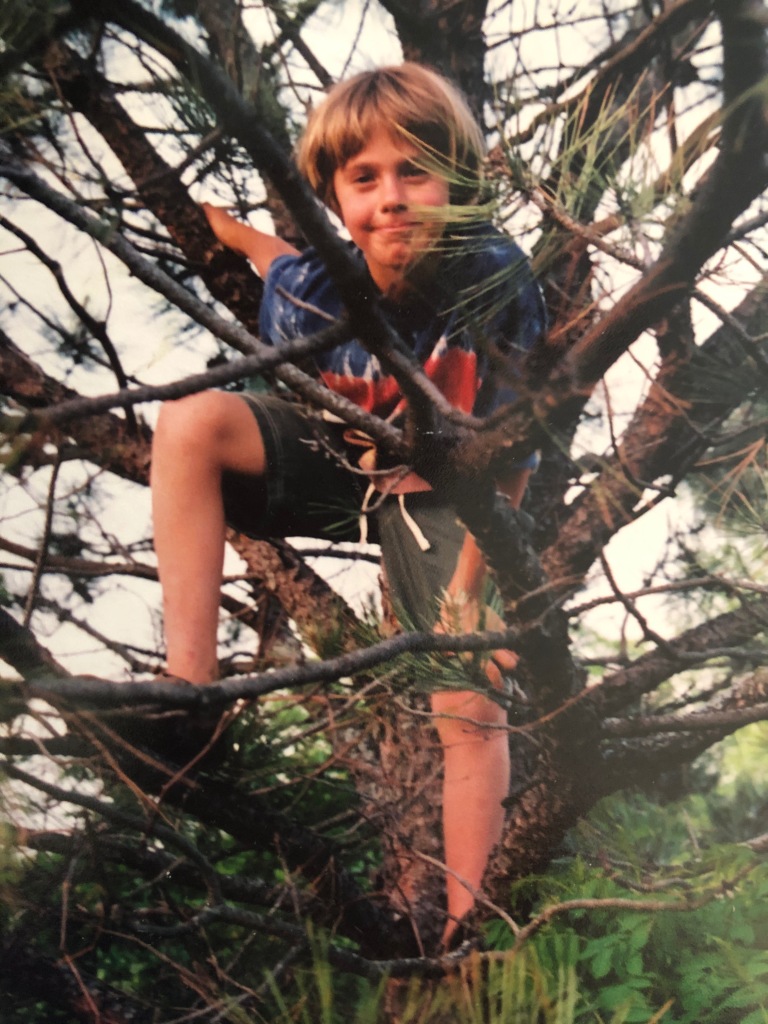
⊗
Enter – Kjersten’s second child. Born on Anishinaabe land on the south shore of Gichigami, where they lived in a Finnish homestead without running water or electricity. Their neighbors included a porcupine, black bears and deer, a pair of bald eagles, an aspen grove, lots of red squirrels, and a bubbling spring where they gathered water.
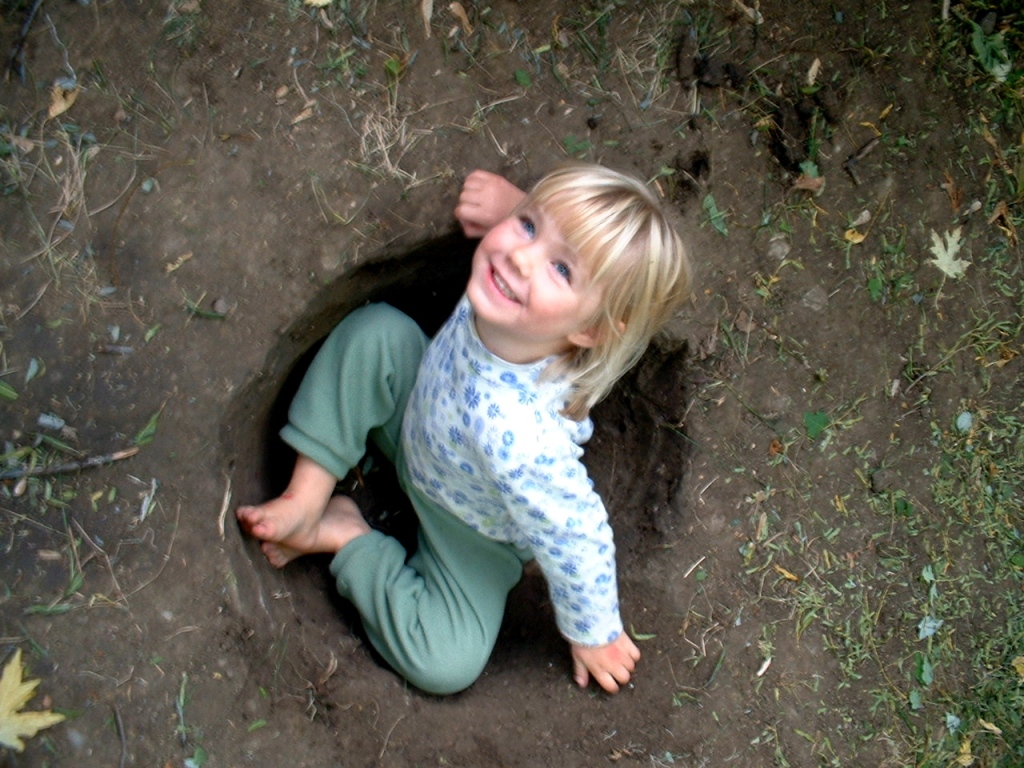
⊗
Kjersten continued to make art and music throughout all these adventures and several exhibitions later, joined a band (Cloud Cult) as a live action painter. Between shows, the band would often gather and jam, occasionally passing a guitar around the fire. After hearing some original songs, a couple of the bandmates invited Kjersten to record a demo album with them at Essential Sessions Studio and encouraged them to start playing open mics in Minneapolis. Here is one of the few documented images of a painting they created on stage with the band:

Listen to Kjersten’s song Dragonfly, from the Essential Sessions EP
⊗
Becoming “Magic Mama”: While Kjersten was working as a crafts teacher and subbing for the grades at a Waldorf school , they had begun making dolls and hats as a side-hustle. The first hat was inspired by a 1960’s 2-piece orange velour get-up found at a vintage shop in Mendocino. The pants were bell bottoms that stretched in ridiculous ways when worn so Kjersten cut them up to use as doll body fabric. The bottom cuff of one pant legs had been sewn to make a bag for one of the dolls, toddler Indigo put the bag on her head and the idea for a cat hat was born. Using what was immediately on hand, the corners became ears, stuffed with little bells and felted. The hat was too big for Indigo, so Kjersten wore it. Immediately, they received requests to make more hats for women who had friends going through chemotherapy. To tell the story of the hat on a tag, describing the cat as an animal ally for anyone on a major life transitional journey, Kjersten wanted to remain an anonymous character and dubbed themself “Magic Mama.”
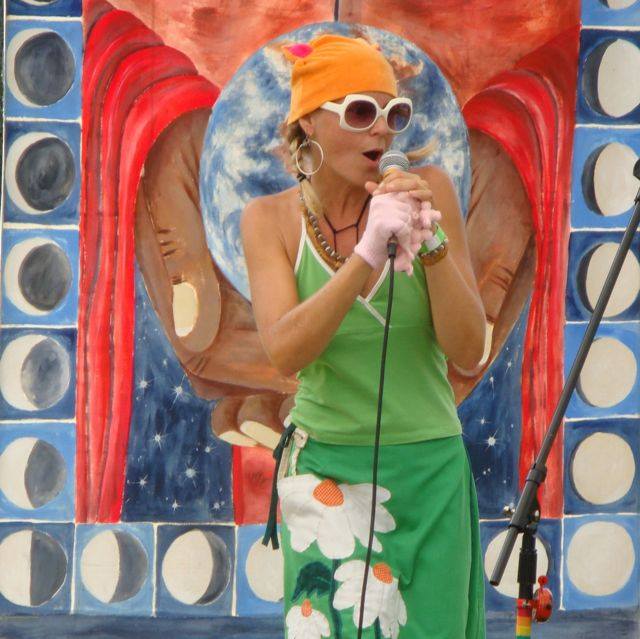
Listen to Magic Mama’s song Go Barefoot!
⊗
Launching a career in music: At one of their first ever open mics, Kjersten was wearing said cat hat and had become known for that product, image and the name Magic Mama. At that open mic, (at a pizza shop that used 3-D glasses to read the menus and the delivery folx wore super hero costumes and drove 3-wheeled electric gigits) Kjersten met several other women artists and formed 2 bands. Not long after, the bands were performing fairly high-profile gigs in the Minneapolis area and were approached by labels and recording artists. One of the bands (Black Blondie) went on to win a MN Music award. The “rock-n-roll” lifestyle, however, was not conducive to raising young children as a single mother, so Kjersten eventually left the bands but was invited to do some solo recording with a producer who had been working at Paisley Park for Prince and was in the process of building his home studio. There was a big decision to make in that moment: Record the singer-songwriter material, or the rhythmic and whimsical music that had been coming through inspired by day-in-the-life of raising children? It seemed most important and life-affirming to record the children’s music first. After a year working in that studio (and having moved to a home 2 hours away in the Chippewa Valley of so-called Wisconsin) the Rodeo deGaia album was born!

Listen to Magic Mama’s song Peace Pirates
⊗
With a fully produced album in hand and the stage name “Magic Mama,” Kjersten created a live performance of the songs, using their loop pedal, guitar, vocals, and a variety of eclectic and non-traditional instruments: a canning jar of water, a drum made of skis, empty chip bags, used charcoal water filters, rainsticks made from cardboard tubes and jar lids. Dressed in costume, with a theatrical stage set that included one of their own paintings, Magic Mama provided baskets full of “waste-struments” that the audience was invited to play throughout the performances. While continuing to raise and home school their children, grow food and build a career as an eco-edutainer, Magic Mama toured the country with their family, performing at schools, libraries, festivals, farmers markets, and other community venues throughout the land. For several years, Magic Mama toured in a green, 1979 diesel Dasher that had been converted to run on waste vegetable oil, most of which was gathered from a Thai restaurant near their home, continually striving toward greater sustainability and a regenerative life.

Listen to Magic Mama’s song Wonky Wheel
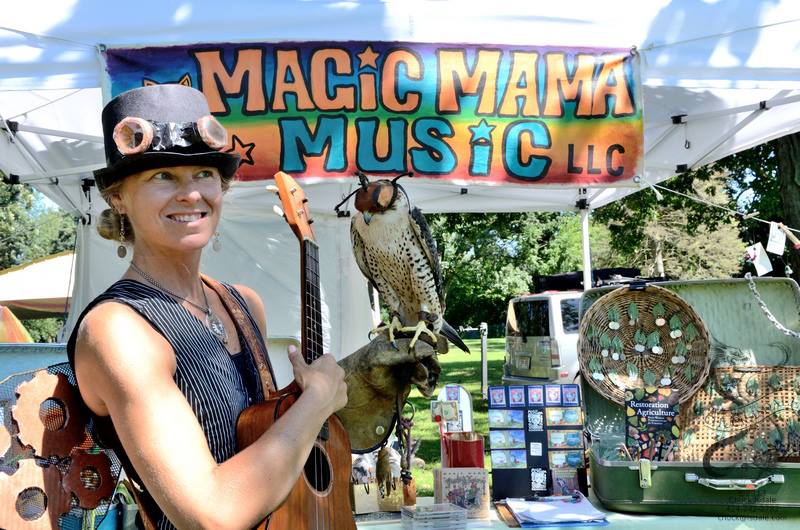
⊗
A year after Rodeo deGaia was released, Kjersten’s second album, Wild Birds was recorded live, with the loop pedal, guitar, harmonium (played with her leg while singing, strumming and looping) at a studio along the Mississippi River. Most of these songs were not intended as “kids music” and were performed more at evening sets at festivals, coffee shops and house concerts, but the name Magic Mama was already in place. The Wild Birds collection are reverent Earthy anthems, celebrating the beauty of nature and the Goddess, full of intricate guitar playing, vocal harmonies, and rhythms. Listen to the title track Wild Birds
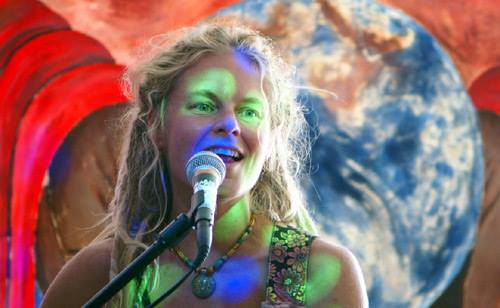
Listen to Black Gold from Magic Mama’s Wild Birds album
⊗
The school of life eventually led Kjersten and their children to Hawaii, where they became acquainted with tropical plants, sea creatures and the deep magic of the islands and Hawaiian culture. From there, they journeyed to Costa Rica for several more months, where they lived in a school bus and helped establish infrastructure on a permaculture farm, immersed in the Spanish language and the Tico culture of the mountains. While there, Magic Mama played several shows in Hawaii and Costa Rica which led to a solo expedition to perform at the Water Woman Festival in Ecuador. Upon returning to Minnesota from that adventure, they moved to what is now called Viroqua, Wisconsin, in the Ho-Chunk driftless region of the Mississippi River valley. It was there that Kjersten had the opportunity to record their third album Renegade Spade, music for the good food revolution. Viroqua is a gem of a small town that includes an Amish farming community, the headquarters of Organic Valley, a thriving home school community and many organic family subsistence farms. There, Kjersten hosted a regular community song circle, directed a home school choir, provided musical support for a regular Kirtan event, assembled a band of “farm punks” for the album recording, and continued touring as Magic Mama.
Listen to the title track of Renegade Spade

Listen to Naka Ima from the Renegade Spade Album
⊗
After leaving Viroqua, Kjersten and their daughter, Indigo (now a very successful artist IG @indigo.degaia) lived for several months on the Big Island of Hawaii while Sage was attending an International School in Duluth, MN. The family reunited in Duluth, where Kjersten worked as a Field Monitor for a non-profit, helping protect the shores of Lake Superior for the Piping Plover. At the end of the school year, the three of them traveled across the Great Plains, over mountain ranges, and found a home in the Willamette Valley of so-called Oregon, on Kalapuyan land, where they now reside. Kjersten worked for many years at an organic vegetable farm and CSA on the eastern edge of the Coast Range, while rebuilding their career as Magic Mama. From there, they toured up and down the West Coast, performing at libraries, festivals, community events, farmers markets and schools.

That was then…now what? Everything changes. Magic Mama’s interactive, live-looping performances were supportive of their life while raising young children. Now, their children have grown and a new life is unfolding with different offerings. Though they still offers workshops and in-school visits, the live-looping show is being composted. New projects are being seeded!
In 2020, the “Pand*a Plot Twist” initiated a pivot of Magic Mama’s school performances of their presentation developed for the No Food Left Behind (NFLB) project with the Corvallis Sustainability Coalition and led to the creation of the videos linked on the home page. Magic Mama is now available for NFLB school presentations in the Corvallis area for 2024 Spring and Fall semesters. Listen to Magic Mama’s song Bump it Up for the NFLB project
One of the more recent collaborations Kjersten engaged in involved creating a musical score for a film that features a farm in Peru that is healing the land by transitioning from commercial to organic. The video is now being used as a promotional tool for Dr. Elain’s Soil Food Web School.
Listen to the song FRESH! from Magic Mama’s Renegade Spade album
ISO! Kjersten is looking for artists to team up with to record and animate her “Rock Song,” a musical geology lesson about the rock cycle. With 10 years of unrecorded music in their pocket, Kjersten hopes to find co-conspirators to help these songs bloom so they may be broadcast far and wide and help to seed the world of our dreams into becoming!

Currently, Kjersten is co-creatrix of an emerging community song gathering: Cascadia Song Rise, now in it’s second year. As an organizer of Cascadia Song Rise, they seek to create an embodied experience of Belonging through singing together in community. Nurturing a life-affirming space of transformation and healing, they give special attention to practices of liberation and dismantling oppressive structures. They embrace a worldview of interconnectedness and are humbly learning through the dynamic practices of diversity, equity and inclusion.
Kjersten now has a BandCamp page and is recording their original songs for communities to sing together. They offer regular monthly CommUnity song circles in Corvallis and Milwaukie, in so-called Oregon, with occasional special events in surrounding areas, including leading song circles at gatherings such as Song Village in Santa Cruz, Singing Alive near Salem, Siskiyou Song Circle in Ashland, and Cascadia Song Rise in Cottage Grove. Would you like to host a song circle in your community? Send a message!
Let’s Connect! via this website or instagram @kj_creatrix
⊗

It takes considerable effort and courage to uproot and start over in a land where there are no previous connections or established support systems. It can also be expensive and exhausting. While Kjersten has learned how to be extremely resilient and resourceful, they also recognize the great privileges associated with being in a white body. We are living in a time of great changes and challenges, on stolen and colonized lands that hold memories of deep trauma that continue to be experienced by descendants of the original stewards of these lands. The school of life continues and Kjersten is committed to learning how to become a better ancestor and ally, each and every day. During these times of the Great Turning (coined by Johanna Macy), may we learn to do the work that truly reconnects!

Listen to the chorus of Kjersten’s song Start Where You Are, the first of many new songs being offered at CommUnity BlesSings song circles
Kjersten is creating beauty, loving the land wherever they are, building community through song, nourishing the landscape, collaborating with plants, places, and people for the benefit of all beings.
